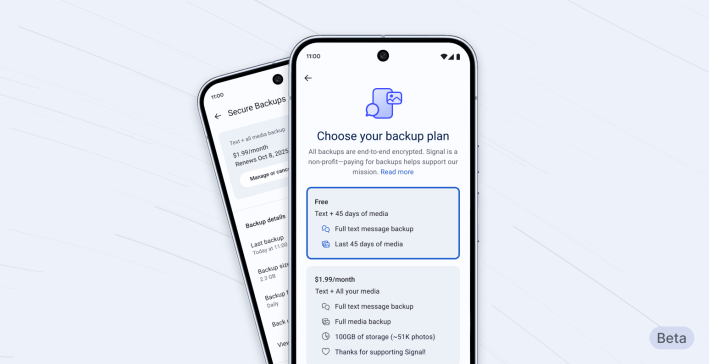For a month my phone was, from a technical perspective, “severely messed up.” I am a klutz on occasion, which is partially why I’ve gotten good at backing up my data, buying the most durable tools possible, and repairing the things that I own. But this time my phone was not only beyond the limits of my repair abilities, but also of everybody I brought the device to, and it contained the only thing I could not back up: my (iOS) Signal history. So, with a heavy heart, I had to let those chats go. So when Signal finally confirmed that they were rolling out “secure backups” in a limited capacity, I was ecstatic, and the timing made me want to throw a brick at a wall.
If you’ve never used Signal before, you should. It’s as secure a messaging app as you’re likely to get, works across most platforms, and is just generally well-encrypted and secure. It’s flexible and can work between your desktop and phone. But because it’s a piece of software that prioritizes security over retention, it has historically been complicated to back your conversations up.
This is by design: though your messages sync across devices, you cannot currently back them up to the cloud. iOS devices like the iPhone are especially annoying as you can only directly transfer it to another iOS device, usually over wifi. (Android phones can work similarly with the option for local backups, and people have built complex, open source tools for this purpose.) I have had to transfer my Signal history over multiple iPhones in the past, and thankfully the old devices were screwed up in a way that was either repairable or did not compromise the integrity of the phone itself.
This time, however, I was not so lucky. Following a freak accident, my phone got messed up in the most specific and annoying way possible: damage to the logic board, most likely the NAND flash. The phone would boot up momentarily, work very poorly for about 30 seconds (and a few times up to 30 minutes), and then promptly reboot. The phone was simply unable to stay on long enough to back up my conversations.
For about 99% of what’s on my phone, it’s not catastrophic. I’m fairly regular at backing up my photos and messages, so while the cost of a new or refurbished phone is bad, it’s mostly not world ending. But I did not want to lose my Signal chat, particularly years of discussions with my one other friend who is just as obsessed with technology as I am, in the way that I am. Both of us are very good at taking notes, but occasionally it would be useful to search the transcript for something one of us linked to in an offhanded way.
So, in my desperation, I spent multiple weeks seeing if a guy could fix the issue. I brought it to a guy who said he fixed it, but didn't, then that guy had to send it to another guy in Sunset Park, who held on to it for a week, said he fixed it, only for it to not be fixed. What’s more, I had already planned a vacation to the Bay Area with my girlfriend and I could not get a new device in time, so I had to navigate the entire trip via the 30 seconds of time my phone could handle, on my girlfriend’s phone, and over café WiFi on an iPad Mini. I cannot stress how embarrassing it is to walk around holding an iPad Mini like a man-sized toddler, although I guess if you have to pull something like that, San Francisco is the place to do it.
By choosing to use Signal on iOS, I had authored the inevitable demise of my texts. Eventually I just got a replacement phone and wiped the old one, those messages wiped away like a sand mandala being dumped into the ocean. I had to live my life. Perhaps this was for the best.
Finally, Secure Backups

In a blog post Monday, Signal announced that they were finally rolling out a beta on Android (with iOS to follow) that allows for secure backups in the cloud. Based on the writeup as well as what’s covered in the support forum, there’s a lot to like and a lot to prod at. The feature is opt-in by default, and covers up all your texts and up to 45 days of media. If you want to store all of your media, Signal offers a monthly paid service (their first, they are a non-profit) of $1.99 to cover the cost of 100GBs of media storage. Media itself is encrypted twice and padded to obscure the file size.
The backup is end-to-end encrypted and locked with a 64-character recovery key. Though another person at the other end of a conversation can back up your conversation without you enabling the feature, disappearing and deleted messages are removed from any archive the way they were intended to. It also introduces a backup format that is readable independently of all clients, which opens up the possibility of theoretically restoring your messages between iOS, Android, and Desktop clients.
As with most security features, the devil is in the details. But security has always been Signal’s highest priority, which is why something as basic and heavily requested as secure backups took so long to figure out. And if there’s a potential exploit, Signal’s user base will probably be the first to figure it out. Though I’m bummed out, this was always something I’d known could happen, and I know this feature would not have rolled out to iOS fast enough to save my conversations. I’m done grieving my Signal history and am tranquil in the knowledge that I can finally shoot my phone with a shotgun without worrying that my secure texts and conversations from close friends will be lost forever.


